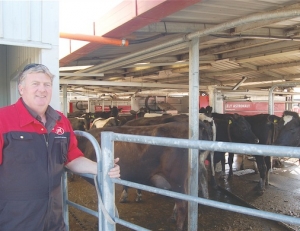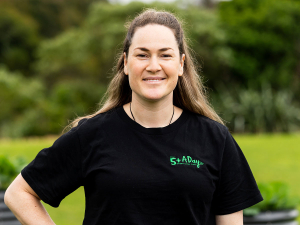Four Lely milking robots milk the cows 24 hours a day, seven days a week; a large barn constructed this year means cows stroll in for a feed whenever they want.
“It’s a 24/7 operation; if you go there at 1am there will be cows going through the shed,” David McConnell told Dairy News.
McConnell says the $2 million investment, including an effluent solids separator and a pond, are improving cow comfort and lifting milk yield.
The McConnells own the 72ha property at Puketaha. This year they are milking 300 cows and hoping to produce 168,000kgMS. Last year they produced 121,000kgMS from 230 cows.
The barn, which has Lely cow mattresses and cubicles, completes McConnell’s farming system and will be a game changer this season, he says.
“We still have to fine tune our feeding and genetics but I will prove this year that with the barn and robotics, we will end up producing more milk from fewer cows,” he says.
“The barns are hugely beneficial, especially during the summer months and it can get quite hot for the cows here. Last November we were doing 29L/cow/day with the temperature about 20oC. In one week the temperature soared to 29oC and our cows lost 5L/cow/day and continued to drop. It becomes too hot and the cows just stand around panting.”
The McConnells farmed in the Southland for 15 years before moving to Waikato for “a bit of the sun”. They started toying with the idea of robotic milking six years ago; however the farm in Southland had two centre pivots for irrigation and the cows were reluctant to walk under them to the milking shed.
After moving to Waikato McConnell looked around and settled for Lely. He was the first farmer in Waikato to install Lely robots; now there are five Lely farms.
“Why I chose Lely….it’s like why you have a Holden or a Ford car. I looked at a few systems and chose Lely because there’re more of them in the world and the support service is great; you can’t fault them.”
The movement of cows in and around the milking shed is controlled by Lely computers. Cows are milked every eight-nine hours; some are milked up to three times in 24 hours.
As cows stroll in, the computer chooses the ones that need milking and sends them to the robots. Those that have been milked but have strolled back in are sent to a new paddock.
The cows come when they wished to be milked. “They flow through when they want to. After milking they will either be sent to pasture or to the barn to get silage; the cows that produce more milk are automatically given more feed by the computer.
“Through the summer months they will be sent to the barn through the heat of the day and get fed silage all day.
“Through winter they are fed a bit of pasture and spend some time in the barn. They are never shut in the barn full time; it’s voluntary – their choice and cow initiated.”
McConnell is confident a better feeding regime in the barn will lift milk yield further. Last year he did 520kgMS/cow and is aiming for about 570/kgMS/cow this season; Waikato’s average is about 360kg/cow. McConnell says he was looking at 600kg/cow but with 60 heifers and 40 new cows introduced to milking this season that would be a tough ask.
Training cows to use the robots is demanding. McConnell spends spring training cows to ditch their mob mentality and adjust to being milked at different times by robots.
Cows also need to be trained to present themselves to the robots. Some will walk into the shed but will just stand there “chewing their cud happily instead of walking to the robot”.
“So now I train them for two or three days and those still reluctant to walk to the machines I let stay there. They get hungry and thirsty and eventually their psyche changes and they walk to the machines.
“You need to pull back; we are so used to pushing the animals.”
Once they are trained, it’s much easier, he says. He has one full-time worker on from 7.30am to 5.30pm. “The working hours are not like a conventional farm where the worker starts at 4.30am and finishes at 6.30pm,” he says.
Apart from a higher milk yield, robotics has other benefits. McConnell’s farm vet costs have dropped. “We have a lot less mastitis, very few metabolic issues and the animals last longer because there is much less stress on them.
“We fully feed the cows; a lot of farms can’t do that because of summer drought and they run out of silage in the barn. Feeding in the barn also results in minimal feed wastage.” Feed costs rise but McConnell points out there’s a 20% lift in milk production.
But technology cannot work alone; the computer system is linked to McConnell’s phone and he occasionally gets a call in the middle of the night when the cups are twisted or a rubber bursts in the machine.
Lely provides a 24-hour back-up service and can be called to the farm for repairs when needed. Software issues are dealt online by Lely’s head office in the Netherlands.
McConnell says robotic milking has been a good experience for him. His advice to other farmers is do the homework and talk to other farmers for a start.
He belongs to an online discussion group run by DairyNZ and including all New Zealand farmers milking by robot. “We learn by talking to each other rather than to the robotic machine sales guys.”















